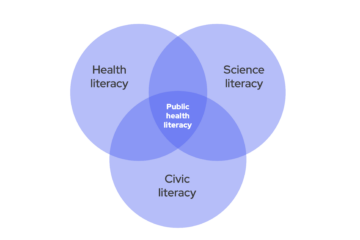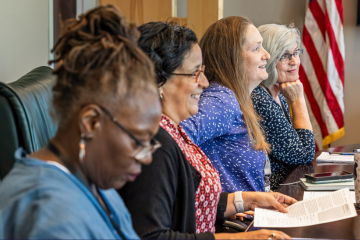
Yes, it has been a long pandemic. Yes, the public are weary of hearing about COVID-19 and taking measures to mitigate its spread. But it’s not over simply because we all want it to be. Many public health jobs are ending, and efforts to fund a COVID-19 aid package are stalled in Congress. But so much work remains to keep the public safe, now and as we look toward the prevention of future pandemics. I’ve spent the last two and a half years working as an infectious disease epidemiologist on the frontlines of the pandemic response, where I have witnessed the devastating impacts of COVID-19 on the public health workforce. My most recent job has come to an end because the COVID-19 grant funding ran out.
With a workload that has increased exponentially along with infections, the culture of working in public health must change to acknowledge our new realities. An online yoga session in the name of boosting “wellness” is not going to cut it among a workforce where 56% report experiencing at least one symptom of PTSD. Trying to boost morale with freebies like a snazzy t-shirt won’t work when 32% of employees are considering leaving their organization in the next year (Public Health Workforce Interests and Needs Survey, de Beaumont Foundation and ASTHO). The public health workforce requires meaningful structural change and long-term development, not Band-Aids. The health professionals I’ve worked with want to see funding that creates actual careers – positions that last longer than a few months, that don’t require us to uproot our lives and move cross-country, and that offer salaries and benefits that will allow us to support our families. We deserve to work within functioning systems, for decent and respectful leaders, using modern technologies. We aspire to meaningful work, with job security, and opportunities for professional training and development.
The health professionals I’ve worked with want to see funding that creates actual careers – positions that last longer than a few months, that don’t require us to uproot our lives and move cross-country, and that offer salaries and benefits that will allow us to support our families.
“But it must be really easy to get a public health job during a pandemic!” I have lost count of how many times I have heard this refrain. But this infectious disease epidemiologist is here to say that it’s not easy. I’ve been looking for a steady job in public health since long before the current pandemic. The biggest change I’ve seen in the public health job market since the start of COVID-19 is the growth of entry-level fixed-term contract opportunities, including positions for contact tracers and community health workers. Those opportunities may seem like a good start, but what happens when those early-career professionals reach the next stage? What’s their path for growth and development? What about people who already have specialized training and experience, who have been working thanklessly in this field for years, constantly reinventing ourselves in order to avoid stagnation and frustration? How can governmental health departments staff up in a high-quality and sustainable manner that will allow them to continue to address ongoing needs for COVID-19 surveillance and mitigation, to investigate newly emerging infections such as monkeypox, to improve emergency preparedness, and to implement a long sought-after data modernization process? How can public health professionals simultaneously maintain and improve existing programs addressing this nation’s other public health burdens, including the epidemics of opioid addiction, chronic diseases, mental health and gun violence?
On the plus side, at least I no longer have to explain what it is that I do as an epidemiologist (I’m not a skin doctor!). But the diagnosis is clear: history of abuse and neglect, persistent generalized dysfunction. The public health workforce needs urgent treatment: Where are the providers ready to write the prescription? And who is willing to pay the bill for this urgent investment in healthy communities?
Dr. Katie D. Schenk is an epidemiologist and public health informatics specialist based in Washington, DC. Since 2020, she has worked on data systems tracking COVID-19 for four governmental health departments.




